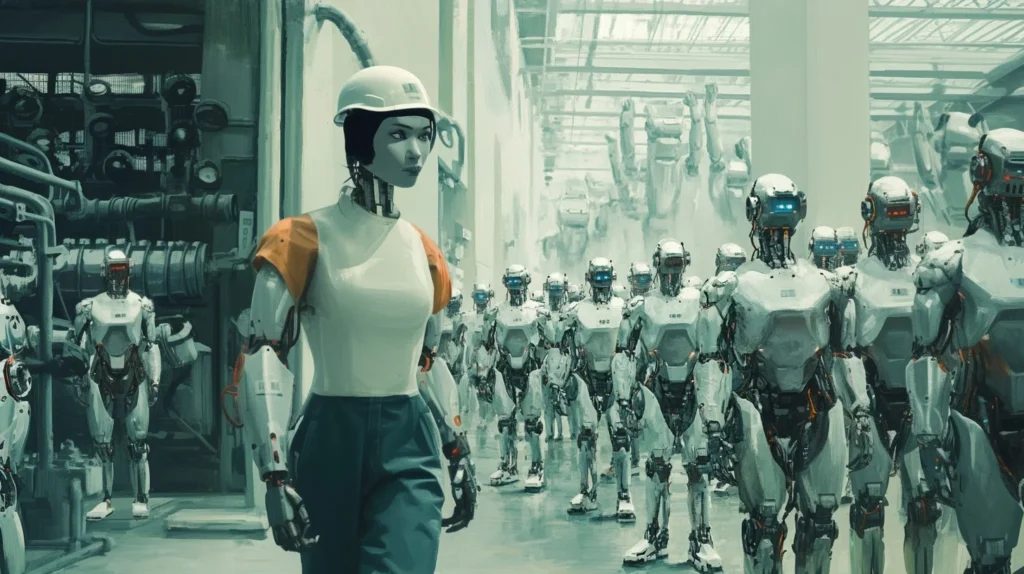The automotive industry—Germany’s economic flagship for decades—is at a critical turning point. We risk losing our production know-how to international players, as highlighted by Tesla’s recent acquisition of MANZ. But it’s not just about cars.
In one of my recent posts, I wrote about Apple shifting its focus from cars to robotics. A billion-dollar wake-up call for us! And Apple isn’t alone: Tesla, NVIDIA, Xiaomi, BYD, and many other tech giants are investing heavily in robotics. They’ve already understood what many in Europe still underestimate: AI-driven robotics is the next industrial revolution, already in full swing. Germany and Europe urgently need a shared vision for this new era!
Currently, we hear and read far too many negative stories about Germany and Europe. This creates uncertainty and paralysis. Instead of proactively shaping our future, we get bogged down in endless discussions while others take the lead. It’s time to stop waiting around—we must act now and reclaim our role as pioneers!
That’s exactly why I’ve developed an 8-point robotics strategy for Germany and Europe, illustrating how cognitive robotics can significantly boost our industries—especially automotive—and open the door to a completely new economic era. By adopting this vision, we can sustainably resolve many short- and long-term economic challenges!
Everything starts with mindset, which I’ve emphasized repeatedly in my posts and speeches.
1. Promote entrepreneurial spirit and visionary thinking for the biggest market of the future
All leading industrial nations have realized that AI-powered robotics will create the largest market ever seen. In Germany, we urgently need to promote entrepreneurship and entrepreneurial thinking to ensure we’re at the forefront of this new age. Given our country’s history, we shouldn’t seek economic prospects through military arms races, but through peaceful, civilian, technological visions focused on human prosperity.
We must consistently focus on key future issues such as digital and physical infrastructure, energy, and intelligent robotics. Politics, media, and educational institutions have a special responsibility to foster a positive public image of entrepreneurs committed to visionary ideas for a better future. We need a “European Dream” promoted in the right places.
We must adopt this mindset, and politicians must quickly stop pouring resources into compensating past failures and instead turn toward the future. Even though many deny it, it remains a fact: our future is still firmly tied to the automotive industry.
2. Retain and leverage automotive industry expertise
Germany still builds the best cars in the world, but domestic manufacturing is no longer competitive. Therefore, the automotive industry needs massive support—but not as backward-looking sales incentives that subsidize overly expensive production. Instead, subsidies should encourage cognitive automation and robotics, enabling the German manufacturing landscape to become sustainably cost-effective and internationally competitive again.
Supporting intelligent robotics solutions would help the automotive industry master the shift in mobility and drive systems, simultaneously establishing a solid domestic foundation for the largest future market: cognitive robotics. This would give all German industries a significant international competitive edge—as long as automotive resources and know-how remain in Germany, providing the crucial head start to become global robotics leaders.
And while we decisively steer toward the future, we must create fertile ground for innovation and investment, attracting international capital to Germany.
3. Forward-looking conditions for innovation-friendly companies
We must remember that visions describe an uncertain future that might one day become reality. Visionary investments, therefore, always carry risks for companies.
That’s why we need modern labor protection rules, enabling companies to keep innovation hubs in Germany and retain top talent domestically. Particularly for high-paid specialists earning €80K or more annually, individual contractual flexibility regarding job security should be permitted, ensuring that investing in the future in Germany offers more opportunities than risks.
By creating such an environment, Germany can soon become the global champion in cognitive robotics, defining the largest market of the future. But no championship is an end in itself. When a national football team wins the World Cup, the entire country benefits! Players and clubs gain recognition and value. The same applies to world market leaders in business. That’s why it’s so essential for Germany to seize its pole position in automation and robotics to lead the global future of intelligent robotics. If we dominate this market—likely larger than automotive and telecommunication combined—many major societal challenges lose their economic threat potential. Here’s one example:
4. Funding social security through cognitive robotics
People in Germany and worldwide are worried about the future of social systems. Our pensions are uncertain, and healthcare contributions keep rising.
A recent IMF study (Broadening the Gains from Generative AI: The Role of Fiscal Policies) highlights that automation of cognitive tasks reduces labor’s share of national income, endangering social systems. Demographic change amplifies this problem.
Therefore, it’s logical to ensure the economic value created by physical AGI products (AI-supported robots, humanoid robots) fairly contributes to financing social systems. Countries not preparing for such changes now risk severe social disruption. Germany, as a pioneer of the social market economy, must demonstrate the political will to develop viable solutions.
This idea may sound utopian today, still requiring many political debates, but it’s only achievable if we intelligently support this economic sector.
5. More sustainable funding inspired by the Mittelstand model
Following the successful example of automotive suppliers, Germany should foster a broad and healthy business landscape in cognitive robotics. Startups and corporate ventures within the Mittelstand deserve significantly more state attention than billion-euro subsidies attracting foreign corporations.
A clear focus on critical future topics like energy, infrastructure, and cognitive robotics is crucial. German startups currently need more capital to compete effectively against the massively funded US tech-hype culture and Chinese state-owned enterprises.
International corporations naturally follow innovative startups—creating a “Silicon Valley effect.” Companies like Kawasaki, Omron, and Delta have already set up near Neura Robotics without billion-euro subsidies. Additionally, societal benefits multiply if, for instance, pension funds invest partially (e.g., 15%) in funds supporting European technology startups focused on defined future themes.
Here it becomes clear how crucial it is for our country to commit to a big, shared goal. Once established, we can begin optimizing everything toward achieving it. If we provide businesses and investors a clear objective with reliable conditions, investors and talent alike will swiftly fill these newly created spaces. There’s enough investment capital available—even in Germany.
Yet money isn’t the only thing seeking a future: people go where there’s hope for their next generation. Hence, we urgently need:
6. A national education initiative on robotics and AI
To attract international talent—not just for employment but for their children’s future—and to transform Germany from technology consumers back into technology creators, we need a nationwide education initiative on robotics and AI. This initiative should also sensitize young people to ethical aspects, preparing them to responsibly shape our digital future.
Integrated into annually updated curricula, students learn robotics, electronics, and AI practically and creatively, acquiring essential future skills and reinforcing Germany’s position as an innovation hub.
7. State-funded robotics projects for public good
Societal challenges like elderly home care or environmental protection can benefit significantly from robotics. In areas lacking immediate business opportunities, government-funded model projects could serve public welfare while simultaneously accelerating the growth of the new robotics economy.
This strengthens Germany’s global robotics leadership and demonstrates technology’s potential to solve pressing societal issues.
8. Progress first, regulation later
To ensure European innovators keep pace with global competitors, regulations like the EU AI Act must encourage innovation, not hinder it. Again, innovation first, rules second—just like cars preceded traffic rules and seatbelts.
Post-election, Germany is at a turning point. Now we have the opportunity to protect, preserve, and expand our industrial know-how—our primary basis of prosperity, especially since we lack natural resources and have already surrendered electronics and internet leadership to others. Cognitive robotics represents our historic chance for a fresh start—let’s seize it!






